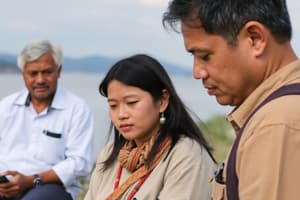Podcast
Questions and Answers
A tour guide notices a potential safety hazard at a popular tourist site. According to professional ethics, what action should they prioritize?
A tour guide notices a potential safety hazard at a popular tourist site. According to professional ethics, what action should they prioritize?
- Posting a warning sign without informing the site management.
- Ignoring the hazard to avoid alarming the tourists.
- Attempting to fix the hazard themselves, regardless of their expertise.
- Immediately reporting the hazard to the appropriate authorities. (correct)
A tour guide is leading a group with diverse cultural backgrounds. How should they handle potentially sensitive topics related to local customs?
A tour guide is leading a group with diverse cultural backgrounds. How should they handle potentially sensitive topics related to local customs?
- Present only the positive aspects of the local culture to avoid controversy.
- Address local customs with sensitivity and respect for all cultural backgrounds. (correct)
- Avoid discussing local customs altogether to prevent misunderstandings.
- Emphasize the superiority of the local culture over others to assert its importance.
Which action demonstrates a tour guide's commitment to maintaining professional conduct?
Which action demonstrates a tour guide's commitment to maintaining professional conduct?
- Arriving late for a tour due to personal reasons without informing the group.
- Accepting expensive gifts from tourists in exchange for preferential treatment.
- Sharing personal opinions on controversial topics during the tour.
- Maintaining a well-groomed appearance and being punctual for all tour commitments. (correct)
What is the most ethical approach for a tour guide when they are asked a question about a historical event but they are unsure of the accuracy of their knowledge?
What is the most ethical approach for a tour guide when they are asked a question about a historical event but they are unsure of the accuracy of their knowledge?
In what scenario is it ethically appropriate for a tour guide to modify the planned tour itinerary?
In what scenario is it ethically appropriate for a tour guide to modify the planned tour itinerary?
How should a tour guide handle a situation where a tourist is consistently disrespectful to local customs?
How should a tour guide handle a situation where a tourist is consistently disrespectful to local customs?
A tour guide is offered a significant commission for steering tourists to a particular local business. What should the guide consider before accepting?
A tour guide is offered a significant commission for steering tourists to a particular local business. What should the guide consider before accepting?
What role does 'beneficence' play in a tour guide's professional ethics?
What role does 'beneficence' play in a tour guide's professional ethics?
What action shows that a tour guide respects the 'autonomy' of their clients?
What action shows that a tour guide respects the 'autonomy' of their clients?
A tour guide knows that a local historical site is undergoing renovations and access is limited, but the site is still advertised as a key attraction. What ethical responsibility does the guide have?
A tour guide knows that a local historical site is undergoing renovations and access is limited, but the site is still advertised as a key attraction. What ethical responsibility does the guide have?
What is an example of a tour guide actively promoting 'environmental responsibility'?
What is an example of a tour guide actively promoting 'environmental responsibility'?
A tourist shares a personal problem with a tour guide and asks for advice. What should the guide do to maintain confidentiality?
A tourist shares a personal problem with a tour guide and asks for advice. What should the guide do to maintain confidentiality?
A local community expresses concerns that tourism is disrupting their traditional way of life. What should a tour guide do to show responsibility to the local community?
A local community expresses concerns that tourism is disrupting their traditional way of life. What should a tour guide do to show responsibility to the local community?
When guiding travelers with disabilities, what is the MOST important thing a tour guide should do during pre-trip planning?
When guiding travelers with disabilities, what is the MOST important thing a tour guide should do during pre-trip planning?
What action exemplifies a tour guide's commitment to 'fairness and justice'?
What action exemplifies a tour guide's commitment to 'fairness and justice'?
A tour guide is leading a group of tourists and witnesses discriminatory behavior toward a member of the group by a local vendor. What should the guide do FIRST?
A tour guide is leading a group of tourists and witnesses discriminatory behavior toward a member of the group by a local vendor. What should the guide do FIRST?
According to general guidelines, what is a key component of providing comprehensive training for staff who interact with travelers with disabilities?
According to general guidelines, what is a key component of providing comprehensive training for staff who interact with travelers with disabilities?
If a tour guide is informed by a traveler about their specific needs related to a disability, what should the guide ensure during the tour?
If a tour guide is informed by a traveler about their specific needs related to a disability, what should the guide ensure during the tour?
What is the MOST effective way for a tour company to continuously improve its services for travelers with disabilities?
What is the MOST effective way for a tour company to continuously improve its services for travelers with disabilities?
A tour guide is notified that a traveler requires a wheelchair due to mobility impairments. How should the tour guide adapt to ensure accessibility?
A tour guide is notified that a traveler requires a wheelchair due to mobility impairments. How should the tour guide adapt to ensure accessibility?
Which of the following is a key action airlines must take by January 16, 2025, to assist passengers with disabilities?
Which of the following is a key action airlines must take by January 16, 2025, to assist passengers with disabilities?
How do tour guides act as 'cultural ambassadors'?
How do tour guides act as 'cultural ambassadors'?
What is the purpose of San Antonio International Airport's Hidden Disabilities Sunflower Initiative?
What is the purpose of San Antonio International Airport's Hidden Disabilities Sunflower Initiative?
How can specialized travel services like Planet Abled enhance travel opportunities for individuals with disabilities and the elderly?
How can specialized travel services like Planet Abled enhance travel opportunities for individuals with disabilities and the elderly?
Flashcards
Integrity and Honesty
Integrity and Honesty
Truthful and transparent interactions, providing accurate information and avoiding misleading statements.
Cultural Sensitivity
Cultural Sensitivity
Respect the beliefs, customs, and traditions of local people and tourists, avoiding offensive actions.
Confidentiality
Confidentiality
Guides should respect the privacy of tourists and not disclose personal information without their consent.
Objectivity
Objectivity
Signup and view all the flashcards
Professional Competence
Professional Competence
Signup and view all the flashcards
Professional Behavior
Professional Behavior
Signup and view all the flashcards
Environmental Responsibility
Environmental Responsibility
Signup and view all the flashcards
Respect for Local Communities
Respect for Local Communities
Signup and view all the flashcards
Conflict of Interest
Conflict of Interest
Signup and view all the flashcards
Fairness and Justice
Fairness and Justice
Signup and view all the flashcards
Beneficence and Non-Maleficence
Beneficence and Non-Maleficence
Signup and view all the flashcards
Autonomy
Autonomy
Signup and view all the flashcards
Appearance and Grooming
Appearance and Grooming
Signup and view all the flashcards
Punctuality and Reliability
Punctuality and Reliability
Signup and view all the flashcards
Knowledge and Accuracy
Knowledge and Accuracy
Signup and view all the flashcards
Respect for Beliefs and Customs
Respect for Beliefs and Customs
Signup and view all the flashcards
Confidentiality
Confidentiality
Signup and view all the flashcards
No Misrepresentation or Dishonesty
No Misrepresentation or Dishonesty
Signup and view all the flashcards
No Forced Tipping
No Forced Tipping
Signup and view all the flashcards
No Alcohol or Drugs on Duty
No Alcohol or Drugs on Duty
Signup and view all the flashcards
Promoting Education and Awareness
Promoting Education and Awareness
Signup and view all the flashcards
Mobility Impairments
Mobility Impairments
Signup and view all the flashcards
Speech Impairments
Speech Impairments
Signup and view all the flashcards
Wheelchairs and Mobility Aids
Wheelchairs and Mobility Aids
Signup and view all the flashcards
Disability Awareness Training
Disability Awareness Training
Signup and view all the flashcards
Study Notes
- Professional ethics are the core principles in guiding.
Integrity and Honesty
- Guides should provide accurate information and avoid misleading statements by being truthful and transparent.
Respect and Sensitivity
- Guides must show respect for the beliefs, customs, and traditions of local people and tourists.
- Actions that could be offensive or disrespectful should be avoided.
Confidentiality
- Guides should respect the privacy of tourists.
- Personal information should never be disclosed without consent.
Objectivity
- Guides should be impartial and objective.
- Bias or favoritism towards any particular group or individual should be avoided.
Professional Competence and Due Care
- Guides should possess the necessary knowledge and skills to perform their duties effectively.
- They should ensure the safety and well-being of tourists.
Professional Behavior
- Guides should maintain a professional demeanor.
- They should be punctual, well-groomed, and courteous with tourists and colleagues.
Environmental Responsibility
- Guides should promote responsible tourism practices.
- Guides should minimize environmental impact and advocate for preservation.
Respect for Local Communities
- Guides should respect the rights and interests of local communities.
- Their tourism practices should benefit the local population.
Conflict of Interest
- Guides should avoid situations where their personal interests could conflict with their professional duties.
Fairness and Justice
- Guides should treat all tourists and colleagues fairly and justly.
- Treatment should be regardless of their background or beliefs.
Beneficence and Non-Maleficence
- Actions that could cause harm should be avoided
- Guides should strive to benefit tourists and local communities
Autonomy
- Guides should respect the autonomy of tourists.
- Tourists should be allowed to make their own choices and decisions.
Professionalism and Conduct
- Guides should maintain a professional appearance and be well-groomed.
- Being punctual and reliable shows respect for the time of tourists and tour commitments.
- Guides should be knowledgeable about the local history, culture, and attractions, and provide accurate information.
- Guides should show respect for the beliefs, customs, and traditions of the local people and tourists.
- Maintaining the confidentiality of information shared by tourists is important.
- Misrepresentation and dishonesty should be avoided.
- Soliciting or forcing tips from tourists should be refrained from
- Intoxication of alcohol or drugs while on duty should be avoided.
- Guides should be concerned with the safety and security of the tourists and take necessary precautions.
- Cooperation with other tour guides and tourism professionals is important.
- Any incidents of injury or death is important to report to the appropriate authorities.
- Treat all people with respect and avoid discrimination.
- Do not solicit clients or gratuities.
- It is important to always wear the appropriate tourist guide badge and carry the registration card.
- Maintain friendly relations and cooperation with other tourist guides and the public.
- Always safeguard your reputation and professional image.
Responsibilities to Local Regions
- Tour guides should encourage responsible travel practices.
- Environmental impact should be minimized and natural resources preserved for future generations.
- Respect for local customs, beliefs, and heritage must be demonstrated.
- Actions that could be offensive or disrespectful should be avoided.
- Supporting local businesses should be prioritized.
- Safety and well-being of tourists should be ensured.
- Clear instructions and guidance to ensure a positive and safe experience is important.
- Guides should know the area and share accurate and up-to-date information.
- Promote cultural understanding and appreciation.
- Fostering positive interactions between tourists and locals.
Responsibilities to Society
- Educate tourists about the region's history, culture, and natural environment.
- Promote a greater understanding and appreciation of the Philippines.
- Guides can play a role in advocating for social justice issues.
- Tourists should be raised awareness about marginalized communities
- Fair and equitable tourism practices should be promoted
- Tour guides should be role models for responsible and ethical behavior.
- Demonstrate respect for the environment, culture, and people of the Philippines
Guiding Travelers with Disabilities
- Ensure that destinations, accommodations, transportation, and attractions are accessible.
- Specialized agencies that arrange trips for people with disabilities should be Consulted
- Airlines, hotels, and transportation companies should be notified if assistance is needed (e.g., wheelchair assistance, mobility aids, or accessible seating).
- Ensure that the traveler has all necessary documentation related to their disability. Verify special accommodations with the airline, and access to airport shuttle services that cater to those with disabilities.
- Check if buses, trains, or subways offer wheelchair-accessible options, and provide information on routes and schedules. Rent accessible vehicles if necessary, or book taxis with accommodations for people with disabilities.
- Travelers can confirm accessibility with hotels.
- Choose hotels with accessible rooms that meet the traveler's needs (e.g., roll-in showers, wide doorways, and adjustable furniture).
- Tourist attractions have accessibility services, such as wheelchair rentals, elevators, or special entrances.
- Help is helpful to ask in advance or when arriving.
- Plan the schedule with breaks, considering the traveler's energy levels and any medical needs, preventing exhaustion.
- Be prepared to reach out to local disability support services if additional help is needed during the trip.
- If the traveler has hearing or speech impairments, ensure communication tools are available at various points of contact
- Look for brochures, maps, or apps with features such as audio guides, Braille, or large print for travelers with visual impairments.
- Ensure the traveler has access to necessary medical care and medication during the trip.
- Research nearby hospitals or clinics that offer services for travelers with disabilities.
- Have a plan in place in case of emergencies, with a list of emergency contacts, medical providers, and accessible transport options.
- Ensure mobility aids can be transported. Arrange specialized equipment needed.
- Be aware that different countries and cultures may have varying levels of awareness or acceptance of people with disabilities and have patience and understanding.
- Be respectful, but offer assistance when needed.
- Apps with information on accessible locations, transport routes, and real-time updates can help guide travelers with disabilities
- Navigation assistance can be found for visual impairment
General Guidelines in Working with Travelers with Disabilities
- Be aware of laws and regulations that protect the rights of travelers with disabilities.
- Regulations can evolve, so stay updated on policy changes.
- Ensure that all staff members are trained to understand various disabilities and the appropriate ways to assist travelers.
- Staff should be familiar with emergency protocols tailored to assist travelers with disabilities, ensuring their safety and comfort during unforeseen situations.
- Ensure that physical spaces are accessible to individuals with mobility impairments
- Implement technologies like hearing loops for the hearing impaired or screen readers for those with visual impairments to enhance the travel experience.
- Encourage travelers to inform you of their specific needs before arrival, allowing you to prepare necessary accommodations.
- Provide assistance as needed, whether it's helping with boarding procedures, offering priority seating, or accommodating service animals.
- Offer information in various formats, such as braille, large print, audio, and digital, to cater to different disabilities. Use clear, high-contrast signage with symbols to assist travelers in navigating your facilities independently. Work with organizations that specialize in disability services to receive guidance and feedback on improving your services.
- Engage with industry groups focused on accessible tourism to learn about new initiatives and standards.
- Systems, such as surveys or suggestion boxes, can gather input from travelers with disabilities about their experiences and improve services.
Common Disablities
- Partial or complete vision loss may need sensory experiences, tactile guides, and assistance with navigation can be visual impairments
- Deaf or hard-of-hearing tourists benefit from visual or tactile communication, sign language, written materials, or assistive listening devices.
- Tourists using wheelchairs or walkers need accessible transportation, accommodations, and venues
- Tourist with cognitive impairments may require clear, simple language, patience, and repetition.
- Tourists with speech difficulties may need alternative communication methods, like communication boards or apps.
- Tourists with conditions like epilepsy or Parkinson's disease may require extra attention for medical issues and emergency preparedness
New opportunities for Travelers with Disabilities
- San Antonio International Airport offers the Hidden Disabilities Sunflower Initiative and therapy dog programs to assist travelers with disabilities
- Emirates has become the world's first Autism Certified Airline.
- Planet Abled in New Delhi, provides customized travel experiences for people with disabilities and the elderly.
- The "Bright Ideas in Travel 2024" initiative highlights organizations and individuals who enhance accessibility and inclusivity in the travel industry.
Studying That Suits You
Use AI to generate personalized quizzes and flashcards to suit your learning preferences.




